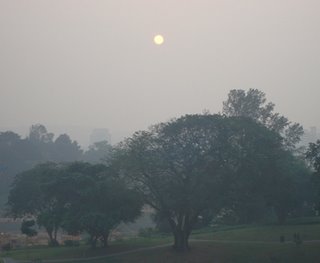
I know you're thinking, "Dude, aren't you like, doing this science thing man? How can you diss it?"
My friend, I've been in this business for five years. Not quite a battle-hardened veteran yet, but certainly
no starry-eyed puppy.So I know what I'm saying. I'm not denying that some parts of science are fun. Like when an experiment works out perfectly and the data matches your expectations. And those entertaining,
bawdy intellectual discussions between fellow researchers.
Then there are... the other parts.
Fresh Brainz counts down the
top five reasons why doing science sucks!5. Moolah: The Lack ThereofFew people do science for the sake of getting rich. Even so, I think people fail to realize just how little money they will make by this career route. This is especially painful when you're in graduate school.
When I saw my first student stipend, my heart sank. It was about the same as the salary of a factory worker. I'm telling you, being a geek, I had always thought that money didn't matter to me.
I was wrong. That hurt.
Should you intend to do science, there
will come a day when a "
less educated" friend drives up to you in a shiny new Honda, complete with an impressive job title, exclusive club memberships and wads of dough.
While all you have is instant noodles to keep you alive.
Did your eyelids twitch there for an instant? Please think twice.
4. What Job Security?
I know some Singaporeans look down on contract work. They prefer to be offered a permanent position.
Here's the real deal: in science there is
no such thing as a permanent position. Research assistants typically get 1-3 year renewable contracts.
Post-doctoral fellowships last three years each. Even assistant professors are on three-year contracts. Only tenured professors get some semblance of permanence.
Very, very few scientists become tenured professors.
Your performance is always being assessed, so it's hard to tell how long you can stay employed. This is one reason why researchers always try to save money when they can.
In Singapore, administrators drive big cars and eat at fancy restaurants, but scientists - even the
directors of research institutes - take public transport.
3. The Devil Is In The DetailsWhen I was a little boy I loved drawing, so my mum took me to an arts class.
I drew stars as little dots because I knew they are faraway suns. My teacher insisted that they should be drawn with five corners, because "we" see them with five corners.
Well I don't. And I have never drawn stars with five corners ever since. I told my mum, "I don't want to have more arts lessons. If I learn too much about it, I will not love art any more."
Unfortunately, doing science is
all about details. You have to check all of the nitty-gritty bits about your research. Previous work, the methods: technology, reagent, protocol, experiment approach, conclusion... lots and lots of painful details. There are often exceptions and ambiguities.
It can become too much sometimes. BORING!
Ultimately,
Mother Nature is the Boss. A complex, messy model that is supported by evidence is always chosen over a simple, elegant model that is unsupported.
Amidst all these rules and details, is there any
room for creativity in science?
Pffft, sure.
It's like manoeuvering a unicycle on a tightrope.
2. Failure Inc.Do you like
failure? How do you like it ten times in a row? Or 100 times? Science is about the cutting edge. Which means that there is
no guarantee of success.To make things worse, experiments usually have numerous steps. If you're lucky, failure strikes you at the first step. If you're not... there'll be a massive amount of troubleshooting to do.
Many times in your research career your self-confidence will be tested to its limits. In fact, my own morale was so devastated after my qualifying exam that I created Fresh Brainz out of sheer frustration!
The public fantasizes about smart people in white lab coats having a quick answer for everything. They have no idea how much work is required just to understand a tiny detail in science.
I think this is the main reason why scientists loathe creationists / intelligent design theorists so much. Those assholes think that "doing science" is sitting on a high pedestal and criticizing everything that scientists do while producing absolutely no experimental evidence of their own.
No it isn't.
1. Where Did My Youth Go?And the Number One reason why science sucks is - the
long duration of training.Young, chirpy idealists enter the profession with dreams of greatness. A few years as an undergraduate. A few years of graduate school. A few more years as a first post-doc. Then the second post-doc...
Year by year your youth trickles away.
One day you will look back and discover that while other people were spending the best years of their life building their families, gaining wealth and generally having fun - you were alone in the lab accompanied only by flasks of bacteria.
Always waiting... waiting for stuff to equilibrate, incubate or terminate.
Not like I am trying to be
discouraging or anything. ;)
 You know, I don't actually watch much TV drama. I especially dislike "science" shows like CSI. Everything is over-dramatized and hyped up.
You know, I don't actually watch much TV drama. I especially dislike "science" shows like CSI. Everything is over-dramatized and hyped up. It is with twisted pleasure that I announce yet another Fresh Brainz exclusive - our first hate review!
It is with twisted pleasure that I announce yet another Fresh Brainz exclusive - our first hate review! A hardworking researcher in our lab is leaving for another appointment, after more than 2 years with us.
A hardworking researcher in our lab is leaving for another appointment, after more than 2 years with us.

 I know you're thinking, "Dude, aren't you like, doing this science thing man? How can you diss it?"
I know you're thinking, "Dude, aren't you like, doing this science thing man? How can you diss it?"
 Today, when I went to
Today, when I went to 
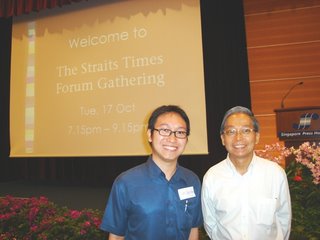
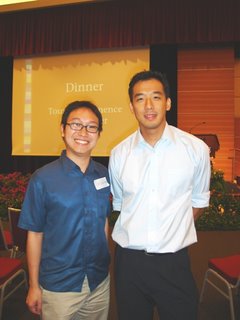
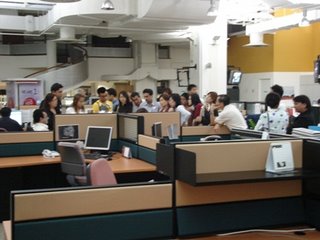

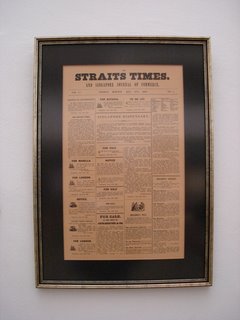



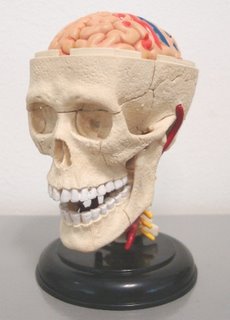 Last week I
Last week I 

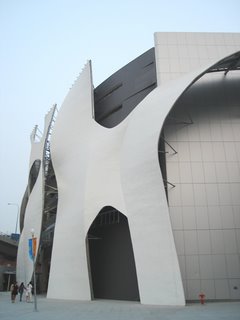


 More than two hundred years ago, there was a theologian called
More than two hundred years ago, there was a theologian called  Sigh.
Sigh.


